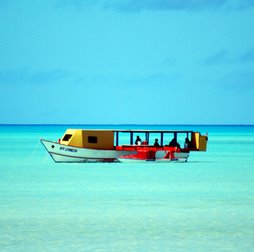Rhiannon Doherty
Kiribati
February 2007
EXPERIENCE2002 – 2004 Rebel Shakespeare Company - Salem, MAProgram Director and Business Manager- Designed and implemented several educational programs and classes
- Formatted and managed company budget and records
- Taught courses on variety of topics, including Shakespeare’s language & basic acting
- Managed staff duties and responsibilities
2004 Cohen-Hillel Academy - Marblehead, MAArtist/Teacher in Residence - “AIDA – Nationalism and Drama” - Implemented original lessons based on the national curriculum guidelines
- Collaborated with students to create performance pieces exploring ‘Aida’ through current issues.
- Trained students in research methods and interpretation techniques of historical materials.
2004 Marblehead Community Charter School - Marblehead, MADrama Enrichment Instructor - Established a new structure and curriculum for school’s Enrichment Program
- Assisted students in improving their basic communication and social skills through drama activities
- Provided students with a guided opportunity to explore cultural understandings and assumptions in a classroom environment
2004 Samurai Scholar After-School Program - Salem, MA
Special Needs Mentor2004 Lynn School Accelerated Program - Lynn, MA
Workshop Director - “A Shakespeare Experience”2003 Peabody Veteran Memorial High School - Peabody, MA
Substitute & Student Teacher2002 – 2003 Shaw Elementary School - Millbury, MA
Workshop Artist - “Life and Times in Medieval and Renaissance England”2002 – 2001 Campfire Organization - Salem, MA
Drama Program Facilitator 2001 Performing Arts School of Worcester - Worcester, MA
Senior Counselor 2000 King’s School - Worcester, UK
Workshop Instructor - “Out of Our Father’s House: American Feminist Drama”
DEGREE2003 – 2004 Massachusetts Dept. of Education at Emerson College
Teacher Certification Program
2000 – 2003 Emerson College (a 4-year University)
Bachelor of the Arts in Theater Education
Graduated Magna Cum LaudeTRAINING/EDUCATIONDrama as Education I & II Credits - 8
Including - Educational Theory
- Curriculum Development
300 hour Teaching Practicum Credits - 12
Theater for Young Audiences Credits - 3
Developmental Psychology Credits – 3
FOREIGN LANGUAGESNone Spoken
PERSONAL INTERESTS/HOBBIESDigital Photography
Web and Graphic Design
Costume/Clothing Design and Construction
Painting
Dance – American and Ethnic Forms
Theatrical Performance
Buddhist Literature and Philosophy
Interest in World Religions
Meditation & Yoga









